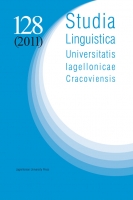Formations of the perfect in the Sabellic languages with the Italic and Indo-European background
Formations of the perfect in the Sabellic languages with the Italic and Indo-European background
Author(s): Dariusz R. Piwowarczyk Subject(s): Language and Literature Studies
Published by: Wydawnictwo Uniwersytetu Jagiellońskiego
Keywords: Sabellic languages; Oscan-Umbrian verb; perfect
Summary/Abstract: The problem of the origin of the Sabellic perfects (in the older literature called Oscan-Umbrian) has been discussed at length very often in Indo-European linguistics ever since the 19th century and the monumental work of Robert von Planta (1892–1897). Still, to this very day it remains a mystery. Various hypotheses have been proposed but none of them explained everything clearly and without problems. Especially intriguing is the fact that the multiple formations of the perfect found in Sabellic languages (reduplicated, simple, -f-, -tt- and -nky-perfects) perform essentially the same function of the preterite tense, being the syncretism of both the Proto-Indo-European aorist and perfect, similarly as in Latin. In the present article the author seeks to present the compelling hypotheses of the origin of the formations of the perfect in the Sabellic languages, evaluate them according to their supposed probability and present the most probable solution to the problem. The Sabellic perfects are classified into groups and each group is discussed as to its origin and development with the Indo-European background in mind. This is followed by some reconstructions underlying the attested forms. The Sabellic formations treated in this article are the reduplicated perfect, long-vowel perfect, s-perfect, simple perfect, -f-perfect, -tt-perfect, -k-perfect, -nky-perfect and the Sabellic future perfect with the characteristic -us- suffix. The discussion is closed by conclusions and the appendix with the complete list of the attested forms of the perfect.
Journal: Studia Linguistica Universitatis Iagellonicae Cracoviensis
- Issue Year: 2011
- Issue No: 128
- Page Range: 103-126
- Page Count: 24
- Language: English

